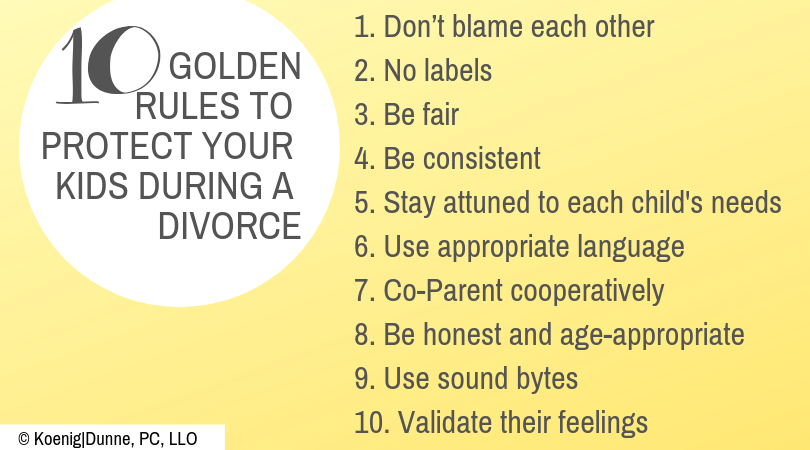
Ideally, parents going through a divorce make it a priority to work together to lessen the negative impact the divorce may have on their children. Although it may be difficult for you to set aside your own marital differences during this stressful time, you can make the transition easier for your children if you follow these 10 rules:
- Don’t blame each other. When you explain the divorce to your children, do it together and avoid blaming each other. It is important for your children to love each parent unconditionally; placing blame makes it more likely a child will build up anger and resentment toward the blamed parent.
- No labels. Assigning negative labels to your spouse — “cheater,” “liar,” etc. — makes it more difficult for a child to stay connected emotionally with him or her. When children are barraged with negative information about a parent, they may begin to believe it and distance themselves from a parent whose love and attention they still need.
- Be fair. It is important for parents to be fair with each other about the time their children spend with them. Making important decisions together regarding schedules, holidays, school, health, and financial matters and showing a willingness to cooperate lets children know you both are making them your top priority.
- Be consistent. Children crave consistency and predictability, and a divorce can really challenge their sense of well-being because of all the changes. The more you can do to keep their routines as normal as possible, the more likely it is that your child will cope well with the divorce.
- Stay attuned to each child’s needs. Every child is unique, and will process your divorce in different ways. Stay attuned to their developmental capacity and be flexible to accommodate each of their individual needs.
- Use appropriate language. Using child-friendly and age-appropriate language when you talk about your divorce helps your children better understand how their world is changing. Use storytelling to help young children explore their feelings and questions.
- Co-parent cooperatively. Children do better when you can cooperate well with your ex in co-parenting. While there may be disagreements about schedules, school, and living arrangements, resolving these quickly and definitively will help your children cope better with the divorce.
- Be honest and age-appropriate. You must take into consideration your child’s age and development level when talking to them about divorce, and you should be honest — within limits. Your children do not need to know adult information (like affairs or financial matters); you can simply tell them you have “adult problems.”
- Use sound bytes. Children process information differently than adults. They learn in bits and pieces, so don’t overwhelm them with too much information at once. Instead, look for opportunities to create ongoing dialogues over time — typically when sharing a favorite activity like playing.
- Validate their feelings. Your children will probably express a number of conflicting emotions during your divorce, and it’s important for both parents to help them process and validate their feelings instead of bottling them up. Listen, acknowledge, and validate — all while providing reassurance and hope that things will get better with time.
Your legal team at Koenig|Dunne is here to provide you with guidance and advice regarding parenting and all of the issues that you will face throughout the divorce process.
